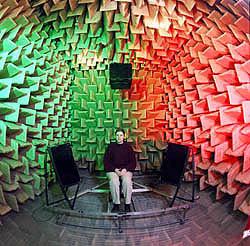Where do you think is silent? alone in a field? reading a book before bed? an awkward silence? well true silence comes in the form of a specially designed room, called an anechoic chamber. Here you experience background noise levels of -12.4dB [1] comparing this to the noise levels described in my previous post, this is damn quiet and as close to silence as it gets. So much so, you start to realise that your own body is a noisy bit of kit, making noises you probably didn’t realise it made.
Why is it quiet?
The room is this quiet due to its special design features. These include the room being built on springs with a low natural frequency, which prevents vibrations from being transmitted from the outside world. Once inside, it has a very specific design feature, this is that all the walls, ceiling and floor are covered with large foam wedges. These wedges are designed so no sound is reflected back to the listener. This is achieved by the sound entering both the foam material and areas in between the wedges, dissipating sound through friction.
The point of these rooms is for measurements, measurements such as loudspeaker response, microphone response or ear protection [1]
Here is a test subject in Salford universities anechoic chamber;
References:
BBC Manchester 27/08/09, The quietest room in the world [online], BBC News, P.1, Available from: http://news.bbc.co.uk/local/manchester/hi/people_and_places/newsid_8224000/8224555.stm [Accessed: 9.3.2014]
